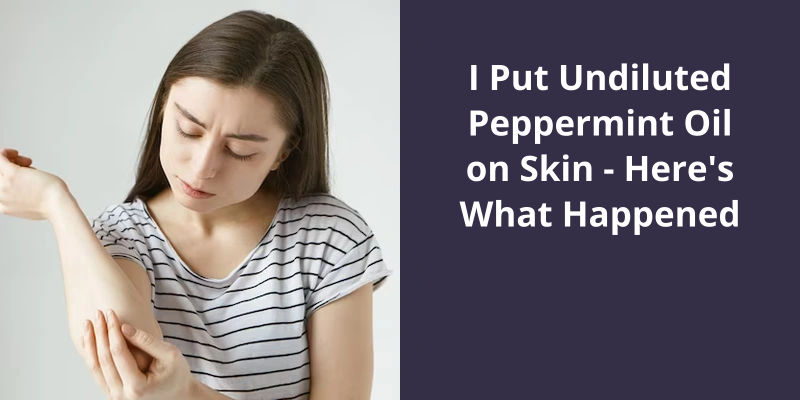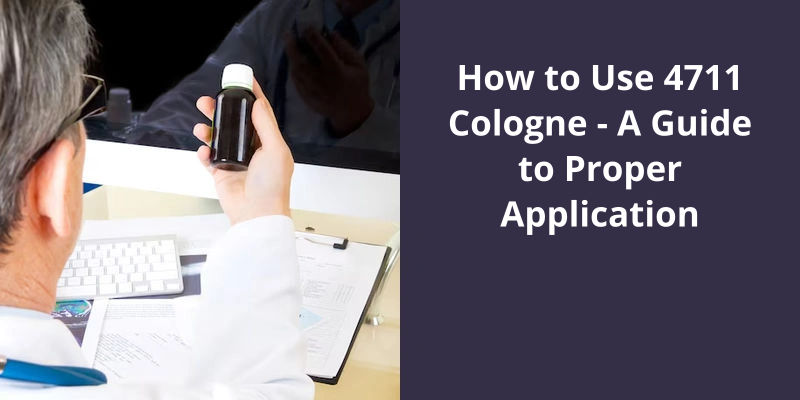When you put undiluted peppermint oil on your skin, you might experience a range of reactions based on the sensitivity of your skin and the quality of the oil. Normally, peppermint oil is quite strong; hence, it can cause skin irritation, redness, or a burning sensation, especially in individuals with sensitive skin. You can also develop allergic reactions that could produce blisters or rashes. Therefore, it’s always recommended to dilute essential oils like peppermint with a carrier oil before application to avoid any potential adverse effects. Despite these cautions, peppermint oil has several benefits including a cooling effect, relief from itching, and reduction of muscle pain.

How Do You Dilute Peppermint Oil for Skin?
Peppermint oil has gained popularity in recent years for it’s therapeutic benefits, particularly in the realm of skincare. However, it’s important to know how to dilute peppermint oil for safe use on the skin. Diluting peppermint oil with a carrier oil before applying to the skin can help prevent irritation and sensitivity.
Carrier oils, such as coconut or jojoba oil, help to reduce the potency of the essential oil, making it safer for use on the skin. Using a dropper, simply add one drop of peppermint oil to four drops of carrier oil and mix well before applying to the skin.
If you wish to use pure peppermint oil on the skin, it’s important to perform a patch test first. Apply one drop of peppermint oil to a small area of skin and wait at least 24 hours to see if any reaction occurs. If there’s no adverse reaction, you may apply the undiluted oil sparingly to the skin, but it’s still recommended to use a carrier oil whenever possible.
Simply mix one drop of peppermint oil with four drops of carrier oil and perform another patch test.
Peppermint oil should be kept in a cool, dark place to prevent degradation. It’s also important to purchase high-quality, pure essential oils to ensure their safety and effectiveness.
DIY Skincare Recipes Using Peppermint Oil and Carrier Oils
- Peppermint oil and jojoba oil facial serum
- Peppermint oil and coconut oil body scrub
- Peppermint oil and sweet almond oil lip balm
- Peppermint oil and grapeseed oil hair mask
- Peppermint oil and avocado oil moisturizer
One alternative use for peppermint oil is to create a refreshing face and body mist with distilled water. By diluting 20 drops of peppermint oil in 50 ml of water, you can enjoy the invigorating aroma and potential benefits of the oil on your skin. But is it safe to dilute peppermint oil with water for skin? Let’s explore this question in more detail.
Can You Dilute Peppermint Oil With Water for Skin?
Peppermint essential oil is a popular natural remedy that’s a range of benefits for both the mind and the body. Among it’s many uses, peppermint oil is known to have a cooling and invigorating effect on the skin, making it a popular choice for skincare products. But can you dilute peppermint oil with water for skin?
In fact, this is a great way to create a refreshing face and body mist that can help to cool, soothe and invigorate the skin. To make the mist, all you need is a spray bottle and some distilled water. Simply add 20 drops of peppermint essential oil to 50 ml of distilled water in the bottle and shake well before each use to help disperse the oil in the water.
One of the benefits of using peppermint oil in a mist is that it can help to calm and cool the skin on hot, humid days. Peppermint has a natural cooling effect that can help to relieve irritation and inflammation caused by the heat. It can also help to reduce redness and puffiness, making it a great choice for use on sunburns or after a day in the sun.
Peppermint is known to have natural antimicrobial properties that can help to fight acne-causing bacteria, while also helping to regulate oil production. It can also help to reduce the appearance of pores, leaving the skin looking smoother and more even-toned.
Peppermint oil can also be used as a natural insect repellent, making it a great choice for use on the skin during the summer months. It’s refreshing scent can help to keep mosquitoes and other insects at bay, while also helping to soothe any bites or stings that do occur.
What Are the Potential Risks of Using Undiluted Peppermint Oil on the Skin?
Undiluted peppermint oil can cause skin irritation, burning sensation, and allergic reactions when applied directly to the skin. It’s recommended to dilute with a carrier oil before use to reduce the risk of adverse reactions.
However, using peppermint oil directly on the skin can also lead to some negative consequences if not used properly. It’s important to understand the potential risks associated with topical use of this essential oil.
What Happens if You Put Peppermint Oil Directly on Skin?
When peppermint oil is applied directly to the skin, it can cause a cooling and tingling sensation. This happens because the active ingredient in peppermint oil, menthol, stimulates the nerves in the skin. While some people find this sensation pleasant and soothing, others may find it uncomfortable or irritating. It’s important to note that peppermint oil should always be diluted before applying to the skin, as it can cause skin irritation or even burns if used undiluted.
One of the most common uses for peppermint oil on skin is for it’s anti-inflammatory properties. When applied topically, it can help to reduce redness and swelling, making it useful for treating conditions such as acne, eczema, and psoriasis. Peppermint oil can also soothe itchiness and irritation, making it a useful remedy for conditions such as sunburn or insect bites.
It can be used topically to treat conditions such as athletes foot or nail fungus. When used on cuts or scrapes, peppermint oil can also help to prevent infection and promote healing.
If you’ve sensitive skin, it’s important to test a small patch of skin before using peppermint oil topically. While peppermint oil is generally considered safe for most people, it can cause skin irritation in some individuals. If you experience any itching, redness, or swelling after using peppermint oil, stop using it immediately and consult a healthcare professional.
It’s important to use it safely and according to instructions, and to be aware of any potential side effects or sensitivities.
Source: Can you apply peppermint oil directly to skin?..
Whether it’s for therapeutic purposes or to add a nice touch of flavor to your favorite desserts, peppermint oil is an incredibly versatile and beneficial essential oil. However, if you’re new to using it, there are a few things you need to know. Here, we’ll explore some of the best ways to use 100% pure peppermint oil for maximum benefits.
How Do You Use 100 Pure Peppermint Oil?
Peppermint oil is a versatile and potent essential oil that can be used in a variety of ways. One of the most popular uses for 100% pure peppermint oil is in aromatherapy. You can add a few drops of the oil to a diffuser or a bowl of hot water to create a refreshing and invigorating scent. The aroma of peppermint oil is known to promote mental clarity, reduce stress and anxiety, and improve mood.
Another way to use peppermint oil is in massage therapy. When diluted with a carrier oil, peppermint oil can be applied directly to the skin and massaged into affected areas. Peppermint oil has a cooling and soothing effect on the skin and can help relieve pain and inflammation. It’s also effective for reducing muscle tension and stiffness.
Peppermint oil is also a great natural remedy for respiratory issues. You can add a few drops of peppermint oil to a bowl of hot water and inhale the steam to clear sinuses and congestion. Alternatively, you can apply a few drops of peppermint oil to a cloth and inhale the aroma directly for quick relief.
For those suffering from nausea or motion sickness, peppermint oil can also be helpful. Simply add a few drops of the oil to a tissue or cotton ball and inhale deeply when needed.
Lastly, peppermint oil can also be used as a natural insect repellent. It can be mixed with water and sprayed around your home or applied directly to your skin to repel mosquitoes, ants, and other pesky bugs. It’s strong scent is a natural deterrent for insects and can eliminate the need for harsh chemical repellents.
Conclusion
Diluting the oil or using it in small doses can still provide the desired effects while limiting the risk of adverse reactions. As with any essential oil, it’s important to educate oneself on proper usage and potential risks before incorporating it into a daily routine.





